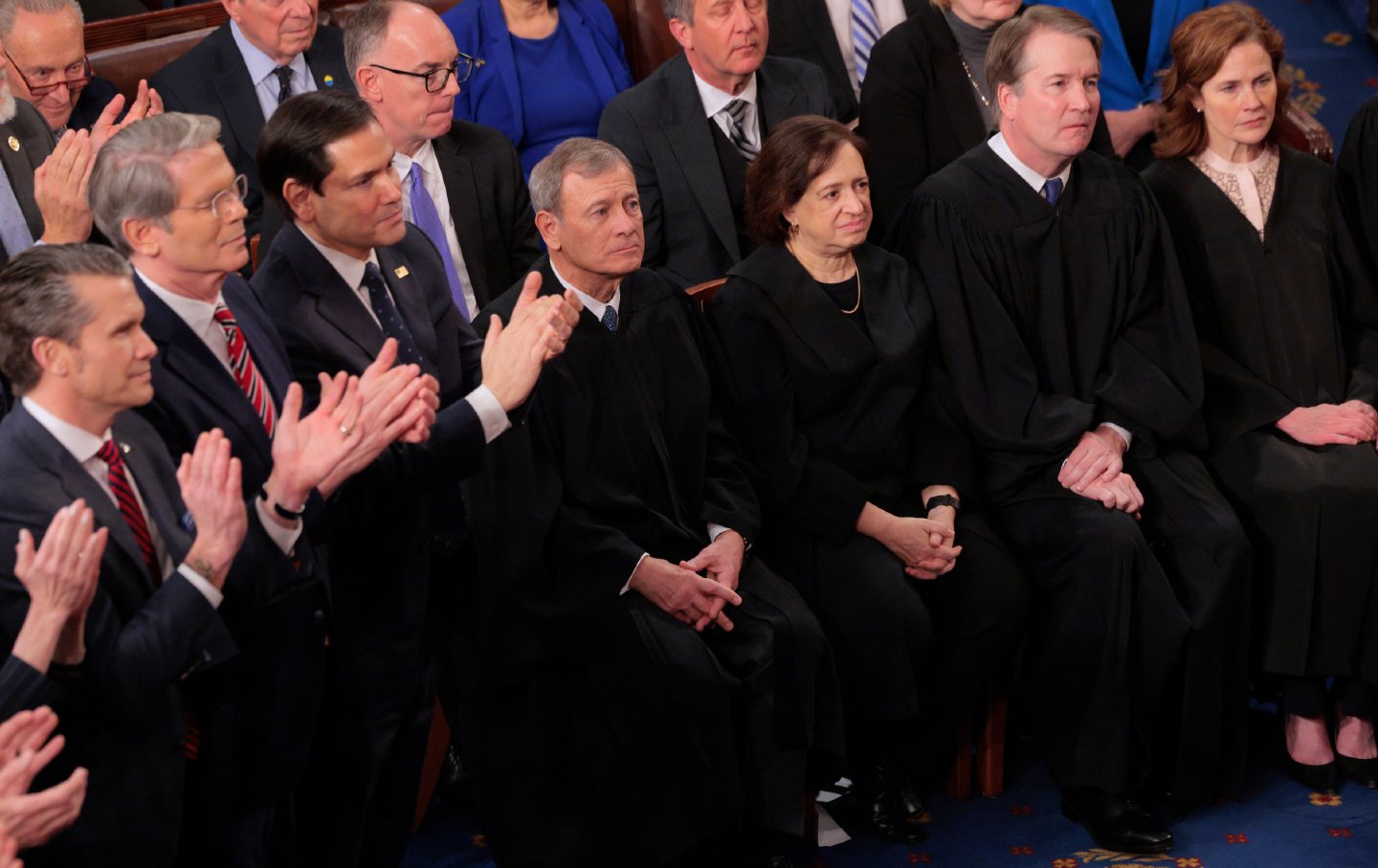How Trump Could Remake the Supreme Court for a Generation
Donald Trump is poised to become the first president since FDR to have appointed the majority of high-court justices. His potential picks are terrifying.
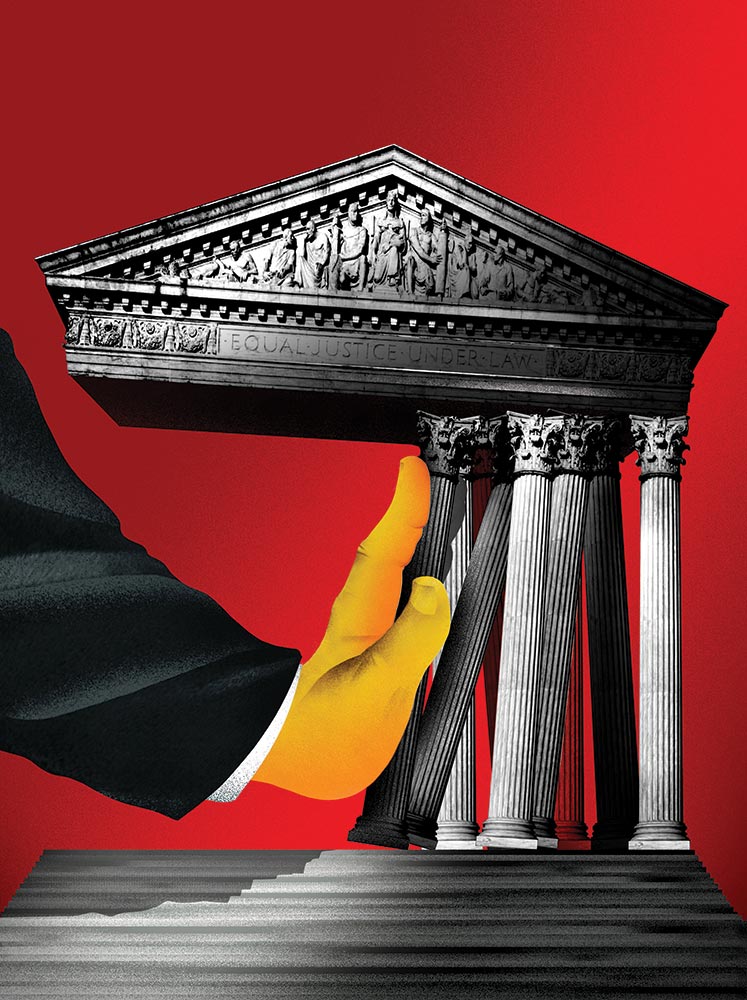
Donald Trump’s first term as president gave the republicans control over the most dangerous body of the most dangerous branch of government: the Supreme Court. With the help of Senate majority leader Mitch McConnell, along with timely retirements and untimely deaths, Trump was able to secure a 6–3 hard-right majority on the court and use it to make the Republicans’ least-popular policy dreams come true. In the brief years since, the court has undermined labor rights, stripped back voting rights, and reduced pregnant people to the status of second-class citizens whose bodies can be controlled by Republican state legislatures eager to use them for labor without compensation.
The Democrats might have used Joe Biden’s four-year interregnum to begin to claw back the Supreme Court from the Republicans’ grip. Particularly during the first two years, with the Democrats in control of the White House and both chambers of Congress, they could have added additional justices to the court. Had they done so, abortion rights could have been saved, voting rights could have been protected, and Trump may have been ruled ineligible to ever run for office again.
Instead, the Democrats did nothing. As the Supreme Court revealed its full moral turpitude to a disgusted public, Congress failed to impose even minimal ethical standards on the justices or cut the court’s funding, while Biden sent court expansion to die in a useless commission.
Now we will experience a time of consequences. Vulnerable communities will pay the price for the Democrats’ inaction—and as bad as the court’s rulings have been in recent years, they are likely to get worse. When the justices are inevitably asked to weigh in on whether Trump can actually revoke birthright citizenship, don’t expect them to stop the guy they literally helped get elected from violating the Constitution. When they hear a lawsuit on whether Elon Musk and his apartheid-adjacent DOGE bros can resegregate the workforce, don’t expect them to honor the 14th Amendment and the Civil Rights Act. As for writing trans kids out of existence while citing the writings of J.K. Rowling as precedent, well, this court has already signaled it’s eager to do that.
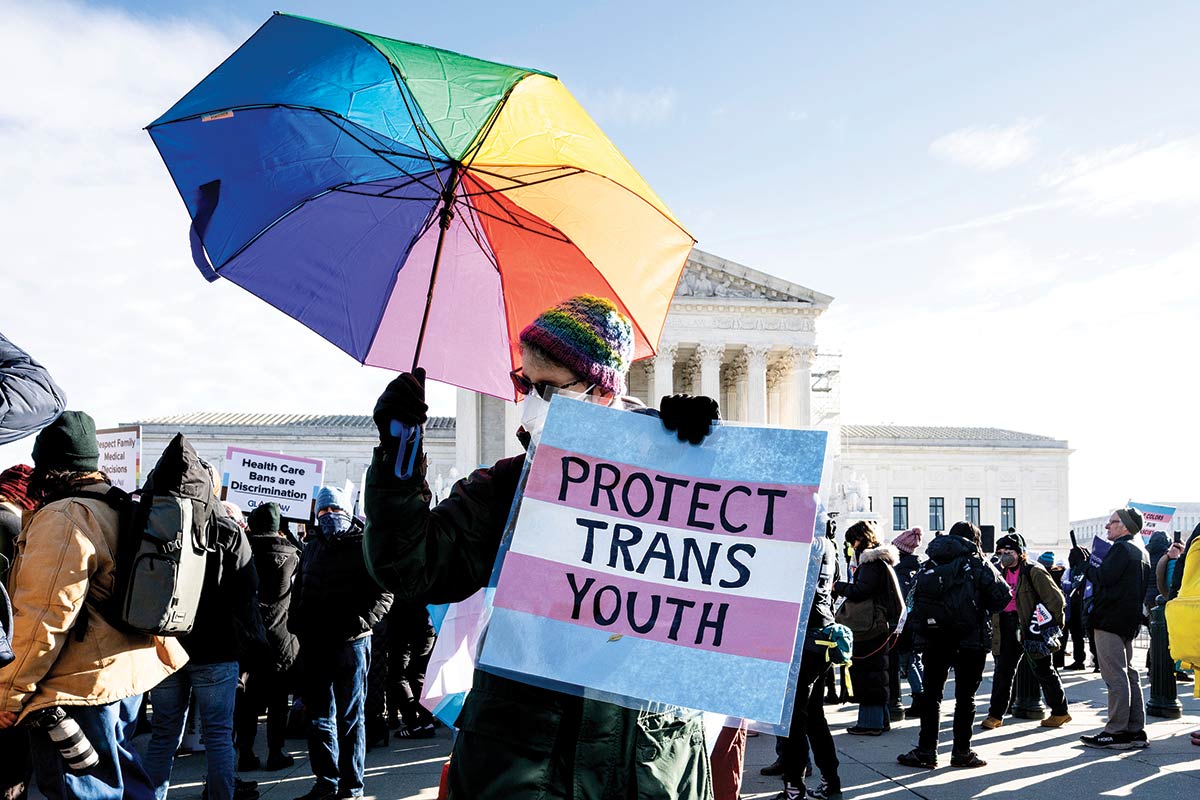
Still, all of this represents just the opening salvo in a GOP reign of terror that could outlive Trump and most of the people reading this, because Trump’s reelection gives the Republicans a chance to do something even more extreme with the Supreme Court: to make their judicial control permanent. Backed by a healthy majority in the Senate, the Republicans can swap out their oldest justices for younger blood, entrenching their dystopian view that the Constitution confers unlimited rights to gun owners and nobody else. And if the feckless gods decree that one of the Democratic justices should succumb to the ultimate law of nature during the next four years, the Republicans will be able to appoint their replacement as well, giving them a 7–2 majority.
In the case of either of these events, the Supreme Court will not just have a Republican majority by 2029, when Trump leaves office; it will likely have a Trump majority. Trump is now poised to become the first president since Franklin Delano Roosevelt to have appointed a majority of the justices on the Supreme Court. His justices will outlive him, and their impact on law and policy will outlast whatever temporary tragedies Trump brings forth through his executive orders.
To have that kind of decades-long impact, Trump will require some help from the current Republican justices who are past their sell-by date. Clarence Thomas is 76. Sam Alito is 74. John Roberts just turned 70, and while he is unlikely to retire, life starts to get a bit less certain when you hit your eighth decade. Republican lawmakers and Trump himself will actively pressure these Republican justices to retire and offer them golden parachutes or whatever else their corrupt little hearts desire.
The one most likely to leave voluntarily is Alito. While he enjoys the power of being a Supreme Court justice, Alito is also partisan to his very core and is fully capable of reading the room and an actuary table. By retiring while Trump is in the White House and Republicans control the Senate, he could help out his beloved Republican Party, and that is Alito’s greatest mission in life. Alito (and his wife) are rumored to hate Washington, DC. When Trump gives him the opportunity to be replaced by one of his former law clerks, I reckon he’ll take it.
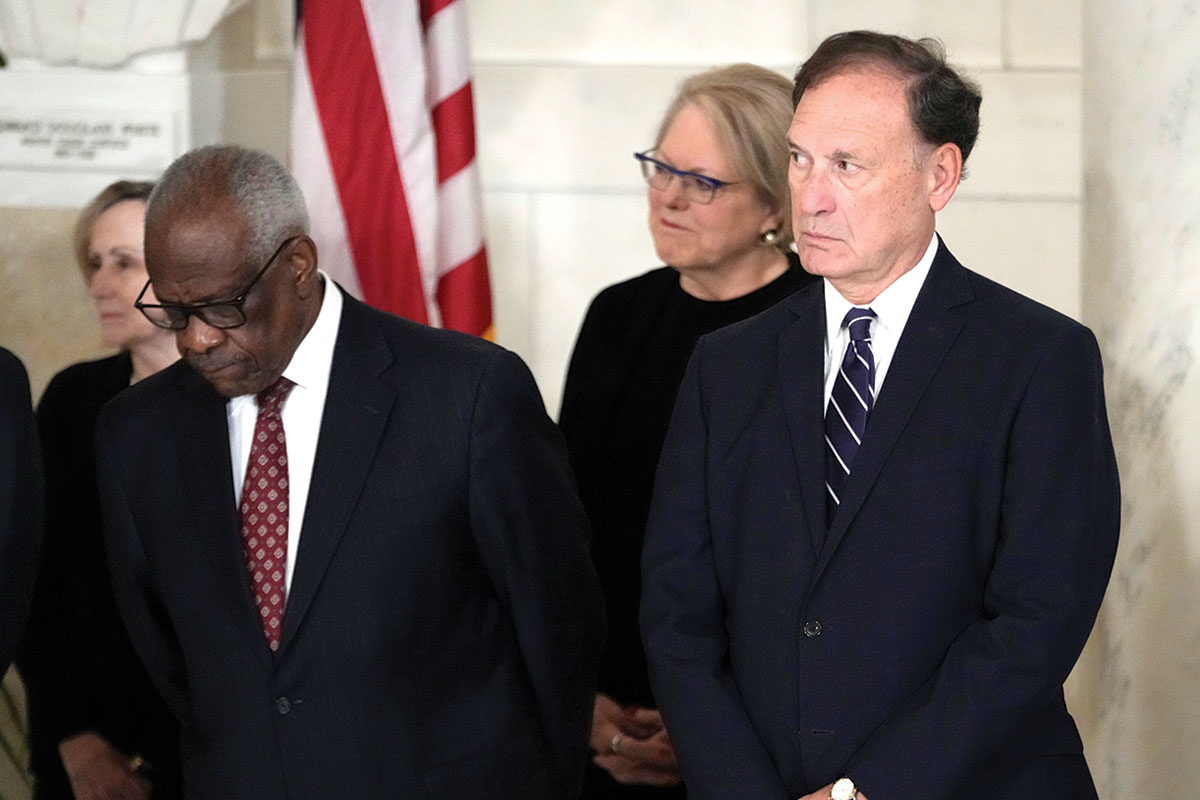
Clarence Thomas, by contrast, will take some convincing. If his health holds, he’s on track to break William O. Douglas’s record as the longest-serving Supreme Court justice—a milestone he’ll reach sometime in 2028. Thomas will never get a spot in the Museum of African American History (unless it opens up a “Sometimes It Be Your Own People” wing), but breaking Douglas’s record is a legacy in itself. And Thomas (and his wife), unlike Alito (and his wife), is believed to really enjoy DC—to say nothing of the many perks that come with being a Supreme Court justice on real estate baron Harlan Crow’s payroll.
Thomas is also an iconoclast, which means that while the pleas for him to retire will get very loud in Republican circles, especially as we approach the 2028 presidential election, he might well resist them. I’ve always thought that, of all the justices on the court, Thomas is the one most likely to die at his desk while doing what he loves, which is taking away rights from Black people and women. Still, I think the raw power of his partisan allegiances will win out in the end—assuming, that is, that Republicans find a university or think tank willing to write Thomas a blank check for the rest of his life.
If Trump does get the opportunity to replace some Supreme Court justices, it’s unclear who will mastermind the actual appointments. Last time, conservative archvillain Leonard Leo called the shots, albeit through his sock puppet, then–White House counsel Don McGahn. Trump’s picks of Neil Gorsuch, alleged attempted rapist Brett Kavanaugh, and Amy Coney Barrett were straight out of Federalist Society central casting.
This time, we don’t know if Leo and his ilk will hold the same kind of power over Trump. Trump’s cabinet appointments show that he values loyal sycophants over competent officials, and there’s every reason to think he’ll try to fill the Supreme Court with people loyal to himself, not Leo. There’s also a new voice in Trump’s ear that wasn’t there the last time: that of shadow president Elon Musk. We don’t know whom he wants to see on the court, but given the amount of litigation that Musk and his businesses are involved in, one expects he’ll have his opinions on Supreme Court appointments, and those opinions will carry weight.
Popular
“swipe left below to view more authors”Swipe →The fluid power dynamics among Trump, Musk, Leo, and the Senate confirmation process—ostensibly under the control of the new Senate majority leader, John Thune—mean that there’s more uncertainty about Trump’s likely Supreme Court nominees than for any incoming president in my lifetime. Indeed, the only thing I can be 100 percent sure of is that whoever Trump picks (and the Senate confirms) will be a deplorable jurist, dedicated to a far-right political agenda masquerading as law, and determined to inject more bigotry, discrimination, and sexism into the Constitution.
Still, in the cauldron of contenders for the nation’s highest court, there are a few names that keep bubbling to the top. Let’s discuss the five most likely people Trump could nominate to entrench one-party Republican rule on the court.

ANDREW OLDHAM
fifth circuit court of appeals
Most people were concerned that Texas’s litigious and nefarious attorney general, Ken Paxton, would be given some kind of federal appointment in the new Trump administration. But the real threat coming from the Lone Star State is Andy Oldham, a circuit court judge who was appointed to his post by, yes, Donald Trump.
Oldham began making his bones as Texas Governor Greg Abbott’s right-hand lawman. As deputy solicitor general of Texas, he served as what the Alliance for Justice called the “architect” of Texas’s strategy to block Barack Obama’s Deferred Action for Childhood Arrivals (DACA) order. He also took strong stances against environmental protections and reproductive rights—and in favor of gun access. He did so well as deputy SG that Abbott elevated him to serve as his chief legal counsel in 2018.
Oldham didn’t stay in that position very long, however. A few weeks in, Trump nominated him to the Court of Appeals for the Fifth Circuit. There, Oldham has done what Trump expected him to do: He has issued opinions overturning the federal ban on ghost guns and defending Texas’s draconian immigration laws and, in one particularly curious ruling, appeared to support vigilante justice. He has also been an outspoken opponent of what the white wing now calls “DEI.”
But none of that is what makes Oldham stand out, as white male judges who like guns and hate women and Mexicans are a dime a dozen these days. The most interesting thing about Oldham is how poorly written his opinions are. He front-loads his overlong musings with enough amateur-historian babble to make Dan Brown blush, then sermonizes with the kind of conservative zeal that recalls John Lithgow’s character in the movie Footloose. The law, if discussed at all, is relegated to afterthoughts and footnotes.
That doesn’t seem to be a problem for people in Trump world, particularly since Oldham has other qualities they like, among them being against the counting of all eligible ballots—and in favor of presidents being free to commit crimes without prosecution. In October 2024, Oldham wrote an opinion in a case about whether Mississippi could count absentee ballots received after Election Day. He argued that federal law preempted the state from counting such ballots—which was a key part of Trump’s strategy to steal the election should he have lost it—but he did grant that the court shouldn’t block Mississippi from counting those ballots unless they were dispositive.
Of course, Trump won the election fairly, and in November, a week after the election, Oldham headlined a Federalist Society event to crow about it. In his speech, Oldham said that we need to make sure that no one is ever charged “on the basis of their politics” (which, again, is the false narrative Trump has been pushing to explain his multiple felony indictments), and also that the judiciary must be protected from “reprisals” from the legislative branch. According to Oldham, those reprisals include commonsense reforms like court expansion and ethics laws.
While Oldham checks all of Trump’s boxes, it’s unclear whether he can count on the support of the shadow president, Musk. Oldham joined the unanimous opinion in NetChoice v. Paxton, a case that explored whether Texas could regulate social media platforms when they censor content. The opinion rejects “the idea that corporations have a freewheeling First Amendment right to censor what people say.” That opinion was later reversed by the Supreme Court, 9–0.
We know Elon Musk likes to pretend that he’s in favor of free speech and against censorship. We also know that Musk likes to reserve the right to throttle content and shadow-ban people who are not tweeting out pro-Republican messages. Oldham’s minority viewpoint on the right of states to regulate these platforms might well be a strike against him.
Still, Oldham has one final ace up his sleeve: He’s a former clerk for and protégé of Samuel Alito. The last two justices who retired voluntarily (Anthony Kennedy and Stephen Breyer) were replaced by their former clerks (Brett Kavanaugh and Ketanji Brown Jackson, respectively). Promising to replace a justice with somebody they mentored is a mighty big carrot that can be used to entice a justice to leave the bench.
Oldham is only 46 years old. If elevated to the Supreme Court, he could wield power for 30 years or more. Replacing Samuel Alito with a Samuel Alito clone who writes worse, and then forcing us to suffer under his legal yoke indefinitely, sounds like the kind of torment the gods might have debated for Sisyphus before ultimately going with the rock.
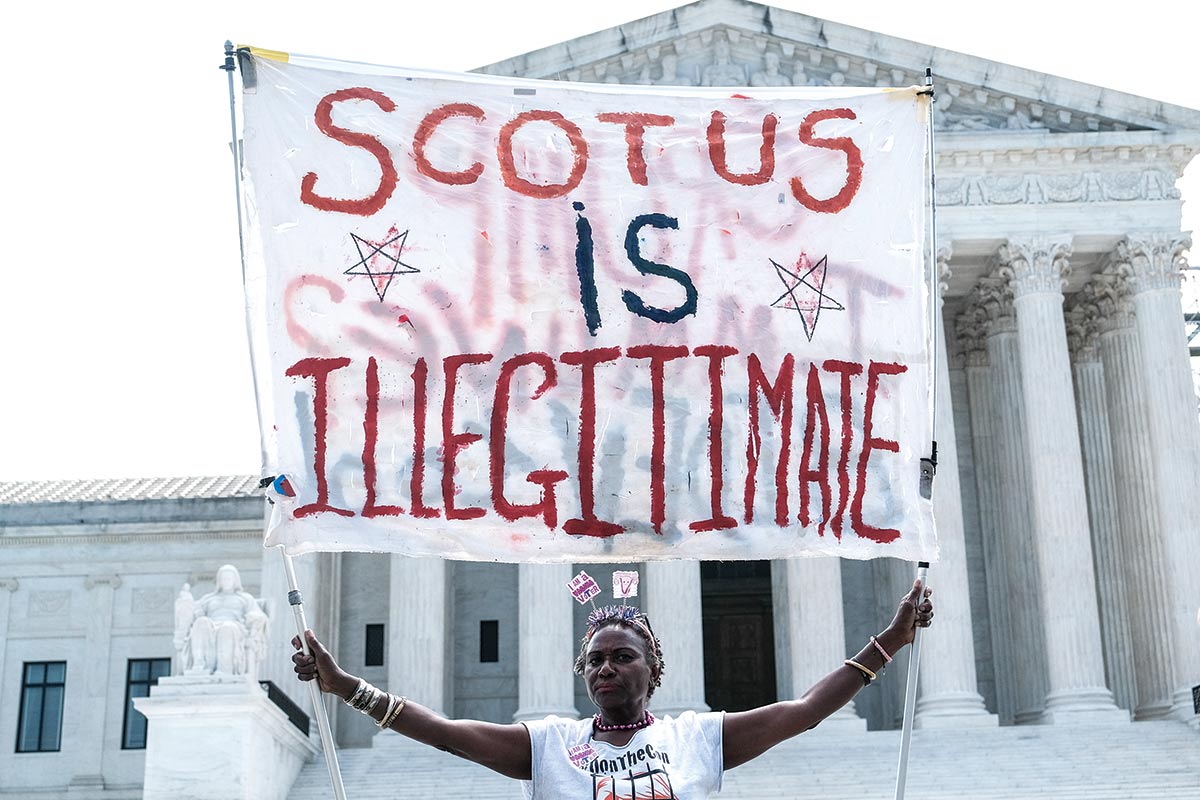
JAMES HO
fifth circuit court of appeals
As I said, it can always get worse. James C. Ho is a former clerk for Clarence Thomas and, as with Oldham for Alito, is being mentioned as a potential enticement for Thomas to retire and pass the torch to the next generation.
Ho is from Taiwan (he was naturalized as a US citizen at the age of 9) and, if elevated, would become the first Asian American justice on the Supreme Court. For all of the Republicans’ bluster and vitriol about DEI, they are happy to play identity politics when it suits them. Amy Coney Barrett, for instance, is on the court in part because Trump promised to appoint a woman (who would overturn Roe v. Wade) to replace Ruth Bader Ginsburg. Replacing the second Black justice, who happens to hate Black people, with an immigrant justice who happens to hate immigrants sounds exactly like Republican thinking to me.
Ho is well qualified to perform what Republicans call jurisprudence these days. After law school at the University of Chicago, he was part of the Bush v. Gore team and helped to get George W. Bush appointed president by the court. Ho was rewarded for these efforts with various positions in the Bush Department of Justice. He then served as chief legal counsel for Senator John Cornyn on the Senate Judiciary Committee before clerking for Thomas. After his clerkship, Ho was appointed to be the solicitor general of Texas in 2008, succeeding Senator Ted Cruz in that job. Trump nominated Ho to the Fifth Circuit in 2017, and after he was confirmed, he was sworn in to his seat by Thomas in Harlan Crow’s library. If you designed the career trajectory of a Republican Supreme Court justice in a laboratory, it would look a lot like the path Ho has traveled.
On the Fifth Circuit, Ho has been involved in nearly all of the hot-button culture war issues that have come before his court, and he has staked out extremist positions with unnecessary concurrences almost every time. He’s concurred in numerous gun cases, always arguing that the Second Amendment essentially prevents any restriction or regulation on gun ownership. He concurred in the case that attempted to ban the abortion pill, mifepristone, and gave the wildest justification on record for why the plaintiffs deserved to have standing in the case: He argued that people like dentists have the right to sue abortion-pill makers because they like seeing pregnant women in the wild.
Ho’s father was an ob-gyn, by the way. Reading his opinions is like going to a wildlife reserve with the Trump children instead of David Attenborough: Everything exists for his personal amusement and enjoyment; any natural beauty and tranquility is pierced by insufferable pseudo-scientific chatter; and something is probably going to get shot.
Ho’s opinions are risible, and some commentators have pointed out that this has had the unintentional effect of making him more powerful and popular in Republican circles. In their world, where “owning the libs” is the most valuable currency, Ho is wealthy. Ian Millhiser has written that “if you could breathe life into 4chan” and give that life form the powers and privileges of a federal judge with a lifetime appointment, “you would have created Judge James Ho.”
If Ho were a man of consistent beliefs, that would be one thing, but he’s really just a guy willing to say anything to get his next job. That’s been on full display since Trump’s election. One of Ho’s longest-standing legal opinions is that birthright citizenship is sacrosanct in the Constitution and cannot be undone absent a constitutional amendment. He’s been on record with that belief for nearly 20 years—until it became apparent that Trump was interested in revoking the right. At that point, Ho changed his tune. In an interview he gave a week after Trump’s election, he said, “No one to my knowledge has ever argued that the children of invading aliens are entitled to birthright citizenship…. And I can’t imagine what the legal argument for that would be.”
James Ho is only 51, and he’s not about to let one bedrock constitutional principle get in the way of his next gig. He has already measured the windows in Thomas’s office, and Harlan Crow is ready to buy him new drapes. If Thomas gets struck by a bolt of lightning in the next four years, it will just mean that Ho has learned how to control the weather.
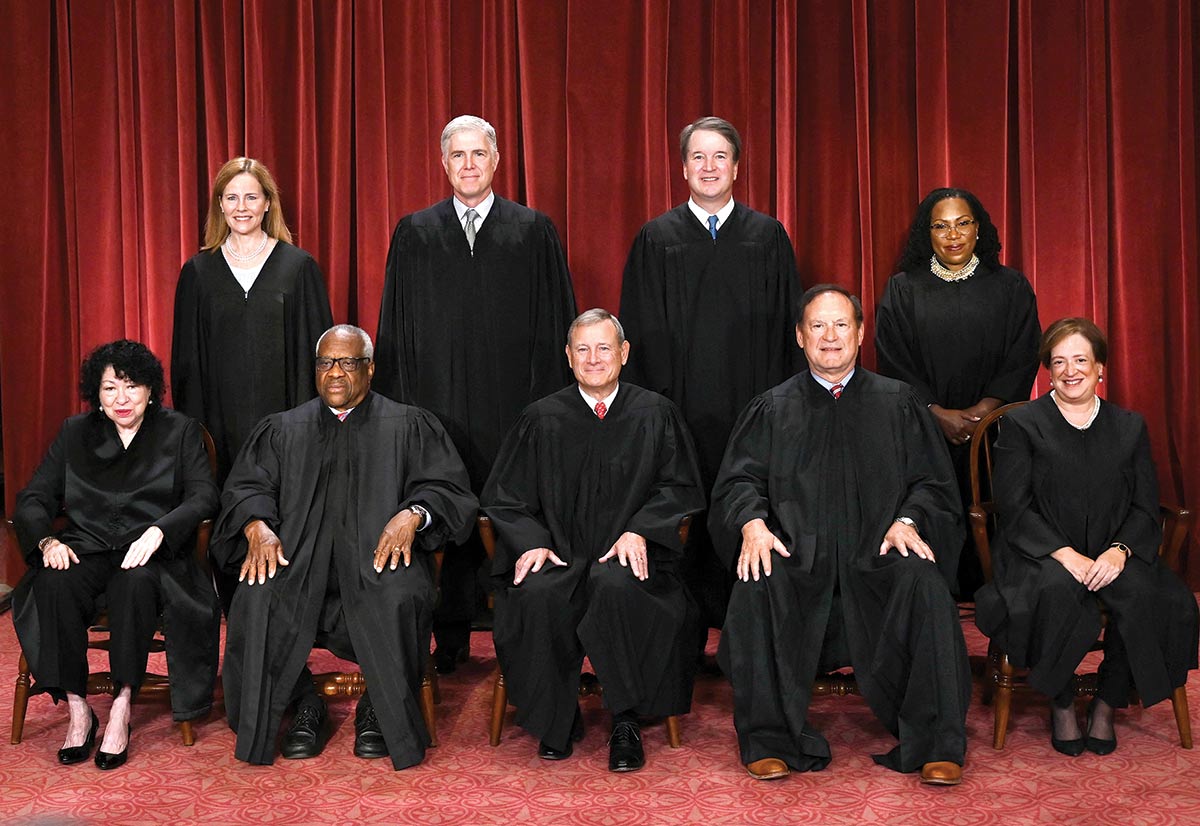
AILEEN MERCEDES CANNON
us district court for the southern district of florida
Aileen Cannon is a mediocrity in the world of judges. She is common, banal. If you threw a dart into any Federalist Society luncheon at any of the top 15 law schools in the country, you’d most likely end up hitting Aileen Cannon or someone just like her. She has no business being on any list of potential Supreme Court nominees, but she likely will be, for one simple reason: Trump likes surrounding himself with mediocrities who owe their careers and status to him.
Cannon was born in Colombia but grew up in Miami. Her mother is Cuban—she left after the revolution—while her father hails from Indiana. After prep school in Miami, Cannon got her undergraduate degree from Duke University. She was a member of the Tri Delta sorority and wrote for Miami’s Spanish-language newspaper, El Nuevo Herald.
From there, Cannon took a bog-standard path to becoming a federal judge on the Republican side. She went to the University of Michigan Law School, where she joined the Federalist Society, but according to a New York Times profile, “she was not an especially visible presence.” She graduated in 2007, and in 2008 she clerked for Judge Steven Colloton, a George W. Bush appointee, on the Court of Appeals for the Eighth Circuit, out in Iowa.
Rather than getting a Supreme Court clerkship, which is what the alleged bright lights in the Federalist Society firmament usually do, Cannon opted for private practice. She went to the law firm Gibson, Dunn & Crutcher, which has a reputation for being an intellectually safe space for conservative-aligned corporate lawyers. She spent three years making money, and then in 2013 she moved to the US Attorney’s Office for the Southern District of Florida, as an assistant United States attorney.
It is, again, not uncommon for AUSAs to make the jump to becoming a federal judge in the district they serve in, and that’s what Cannon did. In 2019, she was contacted by Florida Senator (and fellow member of the conservative Cuban diaspora) Marco Rubio about a potential elevation to the federal bench. After a series of interviews, she was nominated by Trump to the district court in May 2020, at the age of just 39.
Cannon was confirmed to her post on November 12, 2020, during the lame-duck session of Congress after Trump lost the election but before his forces attacked the Capitol. Her confirmation vote was 56–21, so in addition to inexplicably gaining some Democratic support, she also benefited from the Democrats, once again, just not taking judicial appointments all that seriously.
Nobody outside of a few trial lawyers in Miami would know who Cannon is save for the fact that she was randomly assigned the Trump v. United States case after FBI agents raided Mar-a-Lago and found Trump in possession of stolen classified material. Over the course of that litigation, Cannon took Trump’s side at nearly every turn, issuing bizarre rulings that were criticized as wrong and craven readings of the law by other Federalist Society lawyers—and, in some cases, were overturned by the 11th Circuit on appeal. Nonetheless, Cannon dutifully helped Trump delay the prosecution of the case until he was once again the presumptive Republican nominee for president. Then, in July, she dismissed the case outright.
The stolen-documents case was, in many ways, the greatest threat to Trump’s physical freedom, but Cannon made his problems essentially go away. She did not merely slip Trump a bobby pin so he could unlock his handcuffs; she did him one better and effectively hid him in her house so the state could never put the manacles on him in the first place. An AI judge programmed by Musk and Don Jr. to help Trump wouldn’t be as obvious about its intentions as Cannon.
That’s the only reason Cannon is on this list. There are literally hundreds of conservative judges, lawyers, and law professors with more impressive résumés who have proven track records supporting reactionary conservative causes. There are more rabid Trump judges (such as Andy Oldham and Amarillo District Court Judge Matthew Kacsmaryk) who can be relied on to take away the rights of women, gay and trans people, and any non-white person who dares to ask for equal justice in America. But none of those judges have so openly debased themselves to keep Trump out of prison. Cannon’s sole Supreme Court credential is her willingness to read the law in whichever way helps Trump the most.
Trump could reward her for her service without putting her all the way on the Supreme Court. She is, after all, only a district court judge, and so the next logical step in her career would be an appointment to the Court of Appeals for the 11th Circuit (which oversees Alabama, Florida, and Georgia). Giving Cannon a vote on how federal election laws are applied in Florida and Georgia should be enough of a reward for bootlicking. She’s only 43, and so she has more than enough time to use the 11th Circuit to prove that she belongs on the Supreme Court.
But these are not normal times. Fast-tracking Cannon to the Supreme Court would send a shock wave through the conservative legal establishment and tell every career-minded Federalist Society judge that there’s a new sheriff in town—and that loyalty to Trump is even more important than loyalty to Leonard Leo.

NEOMI RAO
dc circuit court of appeals
To paraphrase the character bane as he famously explains in The Dark Knight Rises that Batman is not hard-core enough to defeat him: Aileen Cannon merely adopted the dark; Neomi Rao was born in it and molded by it. Rao has been my pick for the most dangerous person who could be appointed to the Supreme Court for eight years running, and I see no objective reason to demote her in my nightmares.
Rao has expressed vile beliefs since she was very young. While in college at Yale, she wrote in The Yale Herald: “Unless someone made her drinks undetectably strong or forced them down her throat, a woman, like a man, decides when and how much to drink. And if she drinks to the point where she can no longer choose, well, getting to that point was part of her choice.” That statement alone should be disqualifying for a person entrusted with the lifetime power of judging other people’s actions.
Of course, Rao’s statements on rape have not been considered disqualifying by the Republicans. In 2018, she was nominated by Trump to the Court of Appeals for the DC Circuit to fill the seat vacated by (wait for it) alleged attempted rapist Brett Kavanaugh. During her confirmation hearing, when she was questioned about her college writings, Rao said that some of them made her “cringe” and that there were “certainly some sentences and phrases” that she “wouldn’t use today”—and that was enough for the Republicans. She was confirmed 53–46, with every single Republican senator voting for her.
Putting the rape stuff aside (which is apparently a grace we’re required to extend to Republicans in our society), Rao has a long record. After graduating from the University of Chicago Law School in 1999, she clerked for Clarence Thomas and then worked in the George W. Bush administration as an associate White House counsel. In 2006, she became a law professor at George Mason University, which has become a kind of breeding ground for conservative judicial groupthink. She was instrumental in getting the law school’s name changed to the Antonin Scalia School of Law (or “ASSlaw,” as I dubbed it, until they again changed the name to the Antonin Scalia Law School to avoid my acronym). There, she staked out strong positions against Roe v. Wade and the administrative state and in favor of the practice of dwarf-tossing for money. She briefly served in the Trump administration’s Office of Information and Regulatory Affairs before he elevated her to the bench.
Since she’s been on the DC Circuit, Rao has been Trump’s most stalwart defender, often writing as the lone dissenter on panels that go 2–1 against him. She was the only one to dissent in three separate cases involving whether the government could subpoena Trump’s records and financial documents. In a fourth case, Rao argued that special prosecutor Jack Smith should not have been able to subpoena records from Twitter involving Trump’s deleted tweets during the January 6 riot. Rao’s rulings should make Shadow President Musk very happy.
When she’s not busy defending Trump, Rao is busy defending his cronies. She voted to dismiss the case that charged former national security adviser Michael Flynn with being an unregistered foreign agent. She was again in dissent, and Flynn eventually pleaded guilty, which led to Trump pardoning him. But, hey, at least she tried.
Perhaps most troubling of all, Rao has a real love for executions. In the last half of Trump’s first term, his administration ramped up the killing of people on death row. When lawsuits trying to stem the tide of death ended up in front of Rao, she consistently ruled on the side of the executioner.
So when I say Rao is dangerous, I mean it literally. We’re talking about a judge who wants to give everybody from Trump to Robert F. Kennedy Jr. to the common hangman a new set of boots.
As they’re both 51-year-old nonwhite former Clarence Thomas clerks, one could view Rao and Ho as competing for the same seat, should it open up. They have certainly been vying over the past few years to see who can produce the most ludicrous opinions. I’d say Ho has just barely “won” this infernal race, but that’s only because Rao hasn’t had an opportunity to write anything about rape or abortion, where she can truly let her freak flag fly. Rao also seems a little gun-shy when talking to the press, perhaps because of the rough confirmation battle over her college articles, while the most dangerous place in Dallas is between James Ho and a camera.
At 51, Rao is young enough that she doesn’t need to be picked for the first seat that becomes available. But should anything happen to one of the three liberal women justices, then I imagine that under the Republicans’ DEI logic, Rao’s gender would make her an appealing replacement for any of them. Indeed, Rao has done every single thing a conservative woman would do if she wanted to be nominated to the Supreme Court by a misogynistic sexual predator like Donald Trump. That’s what makes her terrifying.
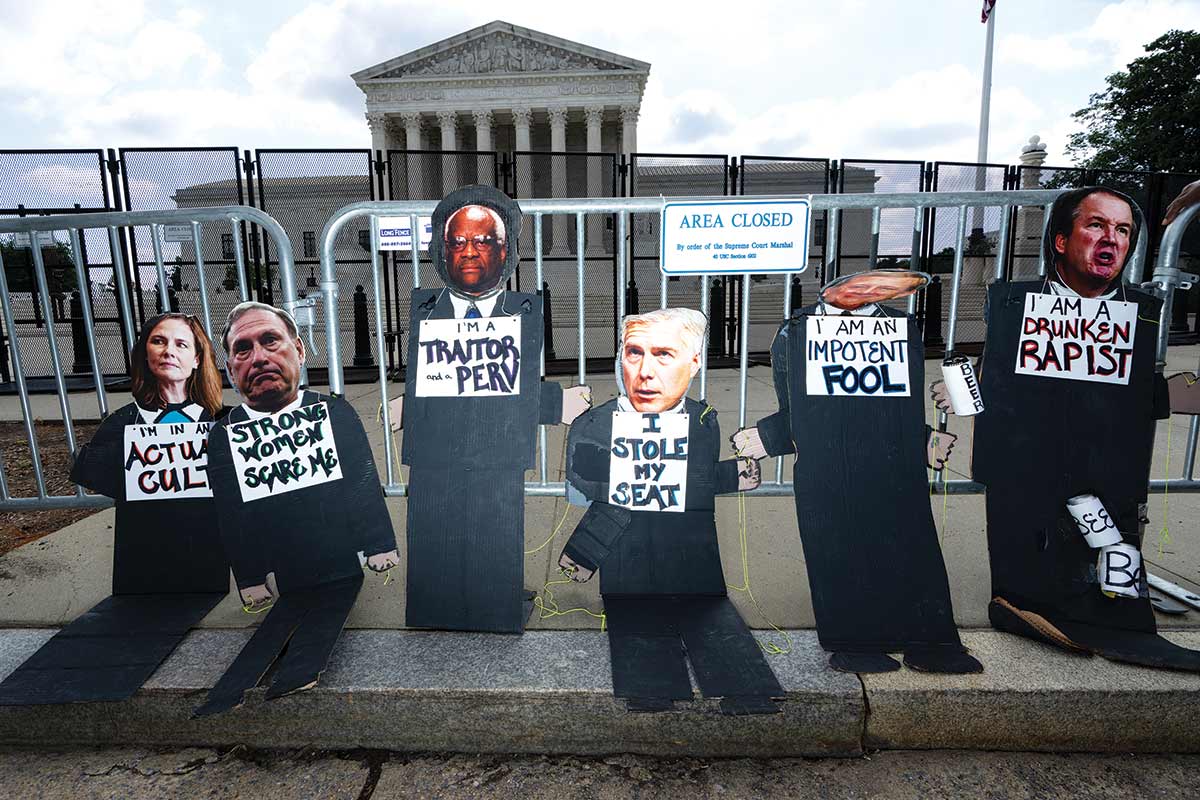
AMUL ROGER THAPAR
sixth circuit court of appeals
Amul Thapar’s appointment to the Court of Appeals for the Sixth Circuit in 2017 was Trump’s second judicial nomination, following right behind that of Supreme Court Justice Neil Gorsuch. What that should tell you is that Thapar had someone powerful looking out for him—and that person was former Senate majority leader Mitch McConnell.
McConnell plucked Thapar from his role as US attorney for the Eastern District of Kentucky back in 2008 and got him appointed as a district court judge under President George W. Bush. Almost a decade later, McConnell pushed for Thapar to make the jump straight from the district court to the Supreme Court for the seat that eventually went to Gorsuch; Thapar’s appointment to the Sixth Circuit was his consolation prize. McConnell again pushed for Thapar when Justice Anthony Kennedy resigned, but that seat ultimately went to Brett Kavanaugh.
Given that McConnell couldn’t get Thapar onto the Supreme Court from his perch as Senate majority leader, I doubt that he can get Thapar there now, given that McConnell is no longer all-powerful and needs to be rebooted halfway through most of his speeches. There must be something between Thapar and Trump that just doesn’t vibe. My (uninformed) guess as to Thapar’s problem is that he’s smart, hardworking, not openly corrupt, and not as intellectually bankrupt as some of the other potential Supreme Court nominees. These are not qualities that Trump values.
So why is he on this list? Because in any normal Republican administration, Amul Thapar would be the first person nominated to the Supreme Court. Ho and Rao are toxic legal lunatics; Oldham can barely pretend to be concerned about “the law”; and Cannon is a golf caddy dressed in ill-fitting judicial garb. Thapar, by contrast, is just a normal extremist Republican interested in doing normal evil Republican things.
Thapar has gotten to the cusp of supreme lifetime power the long way. Born in Michigan to immigrant parents from India and raised in Ohio, Thapar drove a truck for his father’s HVAC business while in high school. He went to Boston College for his undergraduate years and eventually made his way to Berkeley for law school. But he didn’t get a Supreme Court clerkship and instead worked his way into elite legal circles through private practice, a few adjunct professor gigs, and eventually the US attorney’s office. Along the way, he got married and converted from Hinduism to Catholicism.
Compare Thapar’s backstory with those of the men who beat him out for the Supreme Court job. Both Gorsuch and Kavanaugh are scions of wealth and privilege. They both attended the same elite DC prep school; both went on to Ivy League colleges followed by Ivy League law schools; and both spent time working for the Bush administration. They’re pretty much the same guy, and their petty (fascist)-nerd-versus-(attempted-rapist)-jock squabbles belie the fact that they’re experientially indistinguishable.
If it sounds as though I almost like Thapar, don’t get it twisted. Despite his more humble beginnings, Thapar has spent his career trying to make the world safe for privileged white men. On the Sixth Circuit, he’s been a ruthless defender of white patriarchy, with all of the usual Republican outbursts against women’s rights, LGBTQ rights, immigration, diversity, and the poor.
Thapar’s most notable cases involved Covid. He dissented from a ruling that allowed President Biden’s vaccination mandates to proceed. He joined an opinion saying that the Centers for Disease Control and Prevention had no power to impose an eviction moratorium to protect renters during the pandemic. And he wrote a majority opinion denying the fast-tracking of Covid relief funds to women and minority restaurant owners, saying that the law in question unconstitutionally discriminated against white people.
The Republican legal brain trust loves him because Thapar acts like originalism is the one true gospel. He lectures incessantly about originalism; argues that people should withhold funding from law schools that don’t teach it (notwithstanding the fact that every law school makes you read Antonin Scalia’s opinions and forces you to pretend they’re reasonable); and even wrote a sycophantic book praising Clarence Thomas that I won’t read until I’m consigned to Hell. Thapar (along with Gorsuch) is particularly in favor of the “nondelegation doctrine,” which is a thing conservatives made up to essentially argue that executive agencies don’t have a right to exist because James Madison told them so when they asked him with their Ouija board.
Still, for all his best efforts, Thapar is unlikely to get the job. He’s 55, and when Trump didn’t swap him in for Kavanaugh when the attempted-rape allegations dropped (which is what any normal, non-predator president would have done), that was probably his last, best shot at a Supreme Court gig.
But don’t worry too much about him. With bird flu on the rise, Thapar will likely have many more opportunities to make sure that people suffer and die.
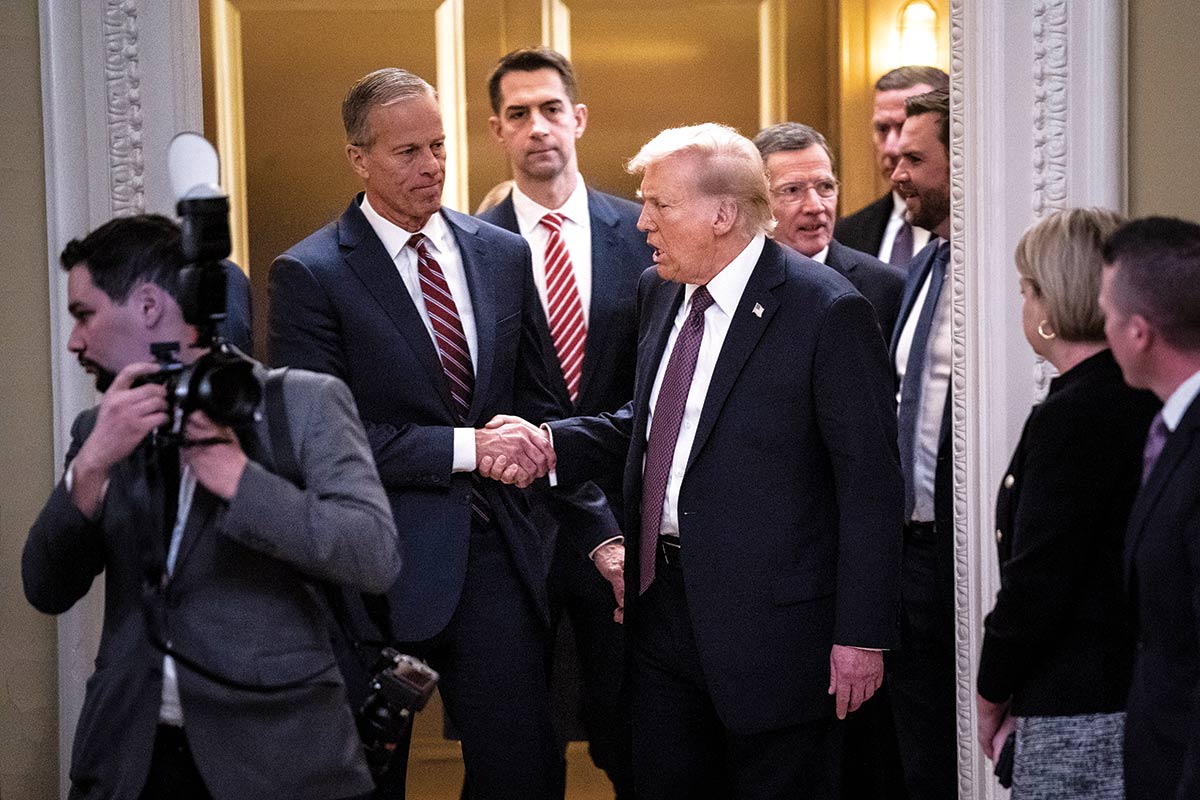
There are a host of other judges who could be in competition for Supreme Court seats as they open up, but if Alito or Thomas should retire tomorrow, these are the people who I believe will get a first look from the Trump administration. The astute reader will note that on this list of potential nominees, four of the five contestants are not white; four are either immigrants or the children of immigrants; and two are women. The conservative legal bench is deep with immigrant and first-generation jurists who are eager to yank away the ladder that their own families used to pull themselves up, and replete with women who are happy to stand in the way of progress for women’s rights.
For all of that, you’ll notice that the basic, standard, Harvard-educated white guy, Andy Oldham, remains at the top of the list and is by far the most likely person to get the first Supreme Court appointment that becomes available. Some of the others might have a shot should Thomas get raptured or otherwise relinquish his “Black job,” but if Alito retires first, it’s going to be a like-for-like switch.
For my part, I hope Aileen Cannon gets nominated. Yes, I’m serious. Of the poisons arrayed before me, I’ll choose the mediocre partisan hack over the experienced and well-trained evildoer.
I learned this lesson the hard way, back in 2005, when George W. Bush nominated one of his longtime friends, Harriet Miers, to the Supreme Court. The elite legal-industrial complex, including both Senate Republicans and Democrats and expensively educated lawyers like me, were appalled. Miers lacked the august qualifications of traditional Supreme Court justices and was nominated only because she was a Bush crony. Movement Republicans threw a hissy fit, and Bush withdrew Miers’s nomination and then replaced her with… Samuel Alito.
What I’ve learned in the intervening years is that there are far more malign and monstrous things lurking in the bowels of the Federalist Society than mediocre partisan hacks. Cannon would be an awful Supreme Court justice, but she’d be awful in simple, predictable ways. Yes, she’d do whatever democracy-destroying thing Trump wants her to do, but in case you haven’t realized it yet, Trump has already won. The damage he’ll do cannot be mitigated by nine law dorks in robes. If the Supreme Court doesn’t rubber-stamp whatever it is that Trump wants to do, he will do it anyway. The battle for the 2020s has been fought, and the bad guys won.
What matters now are the battles of the 2030s and ’40s, when we will (with any luck) be struggling to undo the damage of the white ethnocentric Trump era. The judges and justices Trump picks this term will be the people we have to overcome in that future. I think my children will be better off trying to overturn some Trump-serving gobbledygook penned by Cannon than trying to de-Klan entire doctrines of racist insanity laid down by Oldham or Ho or Rao.
Whomever Trump picks, though, we are in for hard times. The five people on this list are what Americans voted for when they voted for Trump. People will get what they asked for, and they’ll keep getting it until they learn not to want it anymore.
So if you’re looking for hope over these next terrible years, please do not look to the Supreme Court. Please understand that it has been fully captured by MAGA forces. Even if the court blocks one or two of Trump’s policies, there will be countless others it allows to stand. Trump cannot be fought through the courts, because he has already won the courts.
My hope is that Democrats someday realize that the Supreme Court is their enemy. My hope is that the legacy of the Trump court finally and forever weans the Democrats off their nostalgic memories of the Warren court. My hope is that, should the Democrats ever be allowed to take power again, they will reform and disempower the Supreme Court on Day 1, because that will be the first step toward undoing the damage caused by the Trump era, should any of us survive to see the other side of this nightmare.
Hold the powerful to account by supporting The Nation
The chaos and cruelty of the Trump administration reaches new lows each week.
Trump’s catastrophic “Liberation Day” has wreaked havoc on the world economy and set up yet another constitutional crisis at home. Plainclothes officers continue to abduct university students off the streets. So-called “enemy aliens” are flown abroad to a mega prison against the orders of the courts. And Signalgate promises to be the first of many incompetence scandals that expose the brutal violence at the core of the American empire.
At a time when elite universities, powerful law firms, and influential media outlets are capitulating to Trump’s intimidation, The Nation is more determined than ever before to hold the powerful to account.
In just the last month, we’ve published reporting on how Trump outsources his mass deportation agenda to other countries, exposed the administration’s appeal to obscure laws to carry out its repressive agenda, and amplified the voices of brave student activists targeted by universities.
We also continue to tell the stories of those who fight back against Trump and Musk, whether on the streets in growing protest movements, in town halls across the country, or in critical state elections—like Wisconsin’s recent state Supreme Court race—that provide a model for resisting Trumpism and prove that Musk can’t buy our democracy.
This is the journalism that matters in 2025. But we can’t do this without you. As a reader-supported publication, we rely on the support of generous donors. Please, help make our essential independent journalism possible with a donation today.
In solidarity,
The Editors
The Nation




